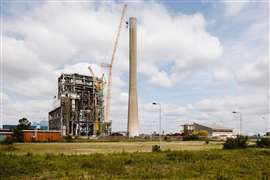Read this article in Français Deutsch Italiano Português Español
Contractors win work on construction of Germany’s €850m Fehmarn Sound Crossing
24 November 2025
 A digital render of the Fehmarn Sound Crossing (Image courtesy of Strabag)
A digital render of the Fehmarn Sound Crossing (Image courtesy of Strabag)
A group of contractors have won spots on seven packages of works for the construction of the Fehmarn Soud Crossing in Germany, which is expected to cost around €850 million to build.
There had been fears that the 2.2km-long tunnel, which forms part of the cross-border Fehmarn Belt Fixed Link between Denmark and Germany, could be delayed.
The Fehmarn Sound Crossing will run between the island of Fehmarn and the German mainland on its northern coast, replacing the existing Fehmarn Sound Bridge.
It increases capacity for road traffic, which will run on four lanes through two tube tunnels. The railway will be routed on two tracks in separate tubes.
It’s a key piece of infrastructure because without it, road and rail traffic from the German mainland would not be able to reach the Fehmarnbelt tunnel portal leading to Denmark on Fehmarn island.
The upgraded Fehmarn Sound Crossing ensures full integration of the German and Danish sections of the corridor.
DB InfraGO has awarded several packages of work to contractors. They are:
Package 1 – Planning:
Ramboll / Böger+Jäckle /TunnelEngineeringConsultants / Arup Germany
Package 2 - Earthworks, civil engineering, and superstructure:
Strabag / Johann Bunte / Eiffage Infra-Nordwest / Züblin
Package 3 – Ablasstunnel:
Wayss&Freytag
Package 4 – Streetworks:
Depenbrock Bau / Kemna Bau Andreae / Yunex
Package 5 – Dredging:
Heinrich Hirdes / Boskalis Nederland
Package 6 - Specialist foundation engineering:
Züblin / Implenia Civil Engineering / Porr Specialist Foundation Engineering
Package 7 - Trough structures:
Züblin
Construction of the new Fehmarnsund crossing was commissioned in 2020.
DB InfraGO said the construction firms will be involved in the project from the planning phase as part of an alliance model, which it claimed would allow for a “significantly more efficient and collaborative transition” from project planning to construction.
Steffi Wulke-Eichenberg, head of the federal/state company DEGES, responsible for the road infrastructure element of the project said, “An alliance like the one officially concluded today between rail and road is unprecedented in Germany. Together, we have a unique opportunity to demonstrate how a rapid and efficient expansion of infrastructure can be achieved in Germany. I am certain that all partners will seize this opportunity.”
DG InfraGO did not give an indication of when the Fehmarn Sound Crossing will be completed. The main Fehmarnbelt tunnel is due for completion in 2029.
STAY CONNECTED


Receive the information you need when you need it through our world-leading magazines, newsletters and daily briefings.
CONNECT WITH THE TEAM











